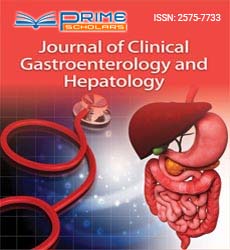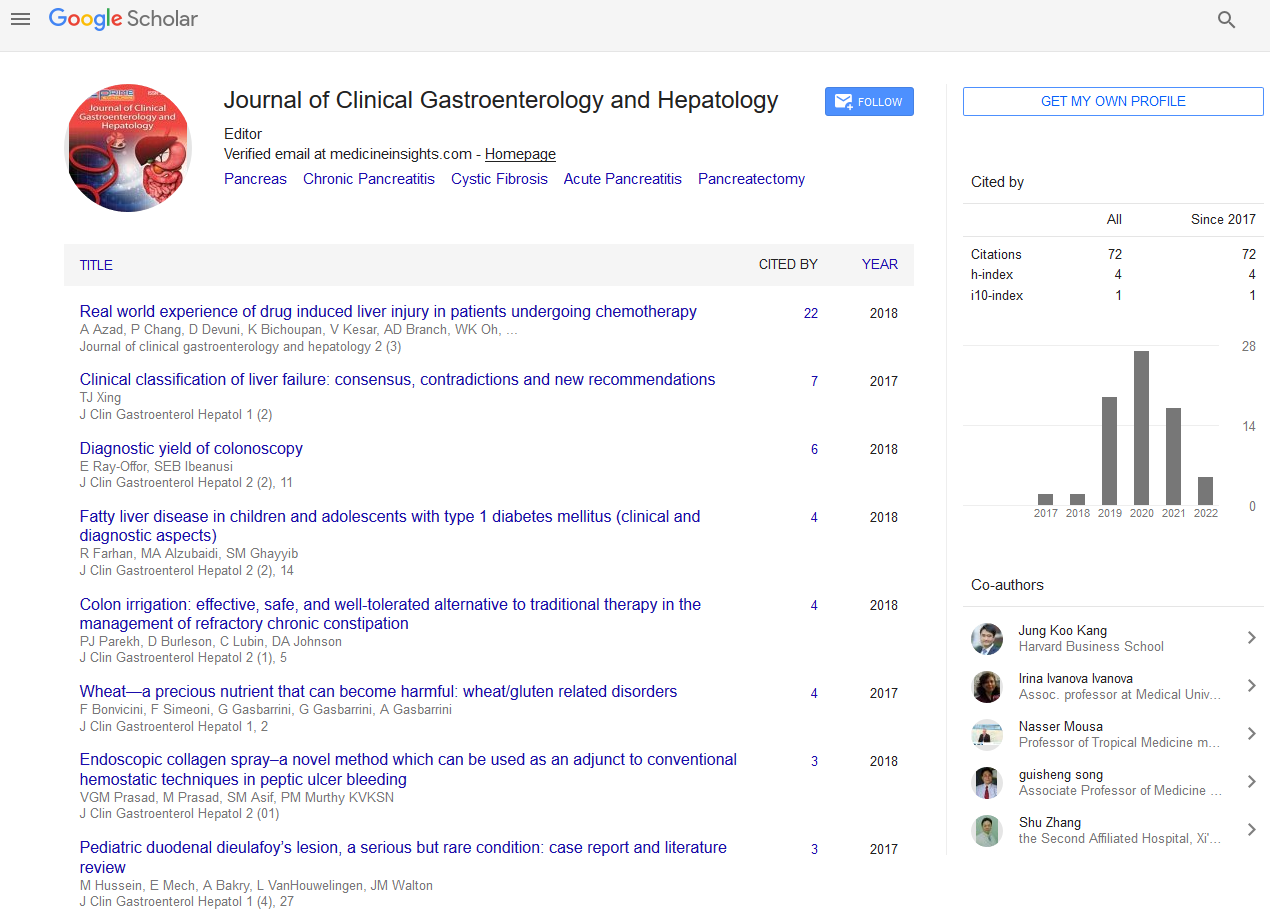Short Communication - (2024) Volume 8, Issue 3
Understanding Rectal Gastrointestinal Stromal Tumors: Etiology, Diagnosis, and Treatment
Thomas Mark*
Department of Gastro-hepatology, Peking University, China
*Correspondence:
Thomas Mark,
Department of Gastro-hepatology, Peking University,
China,
Email:
Received: 29-May-2024, Manuscript No. IPJCGH-24-20561;
Editor assigned: 31-May-2024, Pre QC No. IPJCGH-24-20561 (PQ);
Reviewed: 14-Jun-2024, QC No. IPJCGH-24-20561;
Revised: 19-Jun-2024, Manuscript No. IPJCGH-24-20561 (R);
Published:
26-Jun-2024, DOI: 10.36648/2575-7733.8.3.21
Introduction
Rectal gastrointestinal stromal tumors represent a subset of
rare mesenchymal neoplasms arising from the gastrointestinal
tract. Despite their infrequency, rectal pose unique diagnostic
and therapeutic challenges due to their potential for local
invasion, metastasis, and variable clinical behavior. This theory
aims to elucidate the pathogenesis, clinical presentation,
diagnostic modalities, and treatment approaches for rectal to
enhance clinician awareness and optimize patient care. Rectal
originate from the interstitial cells of or their precursors, which
regulate gastrointestinal motility and peristalsis [1,2].
Description
Mutations in the proto-oncogene or platelet-derived growth
factor receptor alpha gene are commonly implicated in
the pathogenesis of leading to constitutive activation of
tyrosine kinase signaling pathways and uncontrolled cellular
proliferation. While the majority of rectal are sporadic, a
subset may arise in the context of hereditary syndromes,
such as neurofibromatosis and Carney triad. Rectal often
present with nonspecific symptoms, including rectal bleeding,
altered bowel habits, abdominal pain, and palpable mass on
digital rectal examination. The clinical course of rectal varies
widely, ranging from indolent, asymptomatic tumors to
aggressive malignancies with metastatic spread. Large tumors
or those located in close proximity to the anal sphincter may
cause obstructive symptoms or urinary dysfunction, further
complicating their management. The diagnosis of rectal relies
on a combination of clinical evaluation, imaging studies,
and histopathological examination. Endoscopic evaluation,
including rectoscopy or colonoscopy, may reveal an intraluminal
mass or mucosal irregularity, although deeper lesions may be
missed. Cross-sectional imaging modalities, such as computed
tomography and magnetic resonance imaging provide detailed
anatomical information, delineating tumor size, extent of
invasion, and presence of metastases. Definitive diagnosis
requires histopathological examination of tissue specimens
obtained via endoscopic biopsy or surgical resection, with
immunohistochemical staining for serving as diagnostic
markers for the management of rectal is guided by tumor size,
location, mitotic index, and presence of metastases. Surgical
resection remains the cornerstone of treatment for localized
disease, aiming for complete tumor excision with negative
margins while preserving sphincter function whenever
feasible. In select cases, neoadjuvant or adjuvant imatinib
therapy may be administered to downsize tumors, facilitate
surgical resection, or reduce the risk of recurrence. Advanced
or metastatic rectal may require systemic therapy with tyrosine
kinase inhibitors such as imatinib, sunitinib, or regorafenib, to
control tumor growth and improve progression-free survival.
Rectal gastrointestinal stromal tumors represent a rare subset
of mesenchymal neoplasms with diverse clinical presentations
and variable prognoses. A multidisciplinary approach involving
gastroenterologists, surgeons, radiologists, and oncologists
is essential for accurate diagnosis, risk stratification, and
individualized treatment planning [3,4].
Conclusion
Ongoing research efforts aimed at elucidating the molecular
pathogenesis of and identifying novel therapeutic targets
hold promise for further advancing the management of rectal
and improving patient outcomes. Recent advances in the
understanding of pathogenesis have spurred the development
of novel therapeutic approaches aimed at overcoming
resistance to conventional TKI therapy. Second-generation
TKIs, including avapritinib and ripretinib, exhibit enhanced
potency and specificity against resistant mutations, offering
promising therapeutic alternatives for patients with refractory
disease. Furthermore, combination strategies incorporating
immunotherapy, radiotherapy, and locoregional interventions
hold potential for synergistic antitumor effects and improved treatment outcomes in select patient populations.
Acknowledgement
None.
Conflict Of Interest
The authors declare that they have no conflict of interest.
References
- Blay JY, Kang YK, Nishida T, Mehren MV (2021) Gastrointestinal stromal tumours. Nat Rev Dis Primers. 7(1):22.
[Crossref] [Google Scholar]
- Beham AW, Schaefer IM, Schuler P, Cameron S (2011) Gastrointestinal stromal tumors. Int J Colorectal Dis. 27(6):689-700.
[Crossref] [Google Scholar]
- Sullivan MJO (2009) Gastrointestinal stromal tumors. Pediatr Surg Int. 25(10):841-50.
[Crossref] [Google Scholar]
- Pappo AS, Janeway KA (2009) Pediatric gastrointestinal stromal tumors. Hematol Oncol Clin North Am. 23(1):15-34.
[Crossref] [Google Scholar]
Citation: Mark T (2024) Understanding Rectal Gastrointestinal Stromal Tumors: Etiology, Diagnosis, and Treatment. J Clin Gastro�enterol Hepatol. 8:21.
Copyright: © 2024 Mark T. This is an open-access article distributed under the terms of the Creative Commons Attribution Li�cense, which permits unrestricted use, distribution, and reproduction in any medium, provided the original author and source
are credited.

